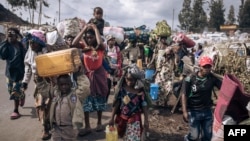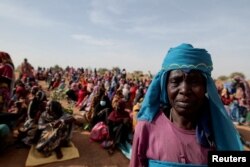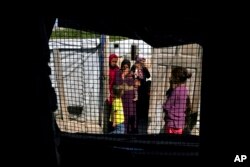In its latest Global Trends in Forced Displacement report, the U.N. refugee agency reported Wednesday that the number of people who have been forced to flee their homes because of war, persecution, human rights abuse and climate change had reached an all-time high of 108.4 million in 2022.
That is an increase of 19.1 million from the previous year and more than twice the number of people who were forcibly displaced a decade ago when the number stood at 42.75 million.
“Every year, this figure has been rising,” said Filippo Grandi, U.N. high commissioner for refugees, noting that new data show that last year’s record number of forcibly displaced already has been smashed.
“It is quite an indictment on the state of the world, if I may say, to have to report that…we have reached now 110 million. So, the figure has gone up again.”
The report finds that last year’s record number of 108.4 million forcibly displaced people was driven by the war in Ukraine and by revised sharply higher estimates for Afghan refugees. It said the eruption of fighting in Sudan in mid-April largely pushed the current global total of forcibly displaced people to 110 million.
“All of this increased displacement is often the result of brutal violence, like in Sudan and complete disregard for international humanitarian law, like in Ukraine, for example,” said Grandi.
All of this, he said “is met increasingly with a more hostile environment, especially when it comes to refugees.
“So, we see pushbacks. We see tougher and tougher immigration or refugee admission rules,” he said. “We see in many countries a criminalization of immigrants and refugees, blaming them for everything that has happened and so forth.”
The report finds refugees, that is people who cross an international border in search of protection, accounted for 35.3 million of the forcibly displaced, while 58 percent or 62.5 million people were displaced inside their home countries due to conflict and violence.
Belying common perceptions, UNHCR statistics confirm that most displaced people around the world are hosted in low-and-middle-income countries, not in wealthy nations.
“I think the prevailing rhetoric is still that all the refugees go to the rich countries,” said Grandi. “This is actually wrong. It is quite the opposite.”
“Seventy percent of the refugees, meaning of those 35 million, actually flee to the country next to their country,” he said. “Most of them actually want to go back home.”
The report confirms that. It shows that some people who have lived in exile for years, albeit a trickle, indeed did go home “voluntarily and safely,” last year. It said over 339,000 refugees returned to 38 countries. While those numbers were lower than the previous year, the report said, “there were significant voluntary returns to South Sudan, Syria, Cameroon, and Ivory Coast.”
Additionally, 5.7 million internally displaced people returned home in 2022, notably within Ethiopia, Myanmar, Syria, Mozambique and the Democratic Republic of the Congo.
“Solutions to these movements are increasingly difficult to even imagine,” said Grandi.
“We are in a very polarized world, where international tensions play out all the way into humanitarian issues, he said. “And, this is very, very worrying…But solutions do happen.”














